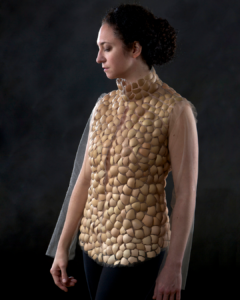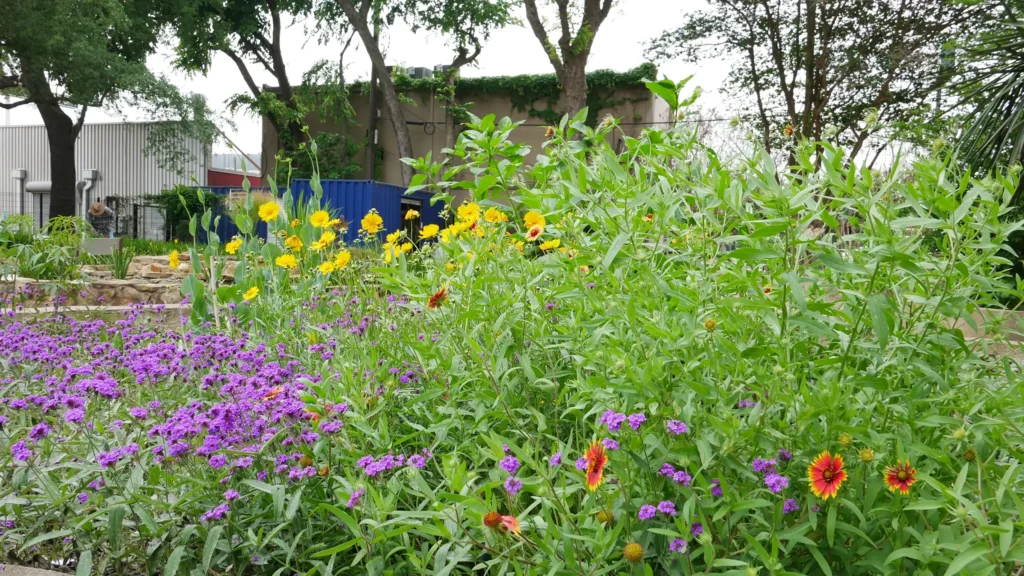With the closing of Crafting Live(s): 10 Years of Artists-in-Residence rapidly approaching, we asked the staff of HCCC to share what their favorite pieces are and why. The exhibition contains works by 36 artists who have participated in the Artist-in-Residence Program here at HCCC during the past 10 years. If you’ve seen the show, please share your favorites in the comments below! If you haven’t, then hurry in, the show closes this Saturday, September 3!
Julie Farr, Executive Director, had a particularly difficult time picking just one favorite piece. Farr explains, “I think it’s because so many of these artists have become our colleagues and friends, and we’ve seen them in process and progressing during their residencies. When the exhibition first opened, I was excited to see how far everyone pushed themselves by making new, meaningful works. I love that both the residency experience and HCCC are a safe haven for exploration, growth and creativity in action.”
Communications Director, Mary Headrick, chose 6 Degrees by Cathy Cunningham-Little. “I think it’s an absolutely stunning installation. The suspended rain-drop-like forms, the amount of light and reflection they create, and the fact that the artist created them from silvered glass is fascinating. These are complemented by the metal pieces below, which cast wide and interesting shadows.”
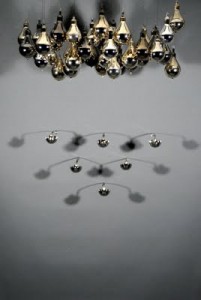
Curator, Anna Walker, chose the imaginary children by Bethany Rusen for two reasons. “One, I’m drawn to works that have a haunting presence and anthropomorphic gesture. But also, I grew to love this piece during installation. Constructed of a nylon fabric stuffed with polyfill, then dipped in clay slip, the forms are awkward, pliable and yet also brittle when handled. On the wall I have a similar reaction to the work as when I held it, and I enjoy that those two interactions complement each other.”
Education Director, Miriam Mendoza’s favorite is Friends by Ann Trask. This piece is made from used tea bags, reclaimed wood pieces, fimoclay, tea-stained muslin and wax. Miriam greatly appreciated the artist’s use of everyday objects, things many people would deem as trash, and re-contextualizing them into objects with meaning. These tea bags are not just trash, but a remnant of the experience of enjoying a cup of tea with a friend. The tea bags have become symbols of the artist’s many relationships and friendships. To Miriam, the piece conveys an important message of not taking for granted the objects and people present in our everyday lives. Miriam also finds the piece to be aesthetically pleasing.
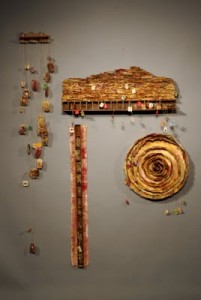
Jenny Lynn Weitz, Marketing and Web Assistant, chose Darryl Lauster’s Runners Up Presidential Plate Series. “I like the fact that Lauster is attempting to commemorate the losing candidates by depicting them on hand-cast porcelain transferware, and even though the stories behind each portrait involve a lot of important political, social and economic issues, I find the installation humorous and sad at the same time.”
Associate Director of Fundraising, Nyala Wright’s favorite is also Darryl Lauster’s Runner’s Up Presidential Plate Series. Nyala chose this as her favorite because the installation of plates is historically informative with an outstanding sense of humor.
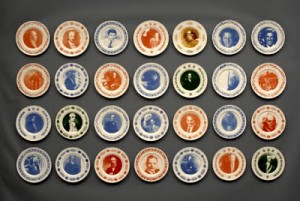
Two staff members also chose Jason Kishell’s Stilted Lemon Growth. Suzanne Sippel, Asher Gallery Retail Manager, wasn’t sure how to describe why, but said, “I like the monstrous lemon, and considering the dreadful things I put lemons through with my tea… well, this is their revenge!”
Curatorial Fellow, Susie Silbert, states, “With so many great pieces in the exhibit, it’s hard to choose just one favorite (well, for me just one favorite is always an issue). Today, I would choose Jason Kishell’s Stilted Lemon Growth. Its craftsmanship is amazing—Kishell’s commitment to his materials and ideas is evident in his close attention to detail in all aspects of the work’s execution, from the detailed veining of the roots on the lemon’s surface to the multi-axis lathe work on its many wooden legs. Stilted Lemon Growth looks like an emissary from a fully formed world inside Kishell’s imagination, leading me to wonder who the other inhabitants may be. The object has the playfulness of a fairytale, the high definition of a video game and enough surface information to keep me interested for quite some time.”
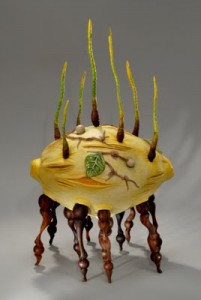
Curatorial Assistant, Ashley Powell, chose Rough Neck by Edward McCartney. McCartney’s clever use of materials is what really struck her, the way he has re-contextualized motor oil through its usage in an object of adornment. Just as so many other valuable natural resources are used to make jewelry, oil has now been fashioned into charms or gems of “black gold,” reminding us of how much of a commodity it is to our contemporary society.

